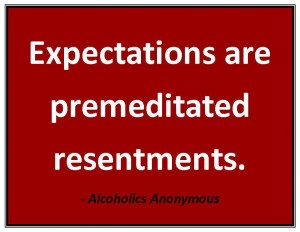 This past weekend, I wrestled with the issue of my expectations of others. I was frustrated why some people (even those closest to me) fail to do simple tasks, to show appreciation, to be motivated, or to strive for excellence. I questioned whether it would be better for me to lower my standards and let go of my expectations of others. This might help to release me from the negative emotional bi-product of resentment and disappointment.
This past weekend, I wrestled with the issue of my expectations of others. I was frustrated why some people (even those closest to me) fail to do simple tasks, to show appreciation, to be motivated, or to strive for excellence. I questioned whether it would be better for me to lower my standards and let go of my expectations of others. This might help to release me from the negative emotional bi-product of resentment and disappointment.
I then considered the counter argument that people (especially children) will rise to your expectations. You’ve probably heard about the research studies that showed elementary school teachers’ expectations of their students are highly correlated with the academic success and growth (or lack there of) of their students.
Does this suggest that people will rise (or fall) to meet our expectations? Does the same hold true for our own expectations and beliefs about ourselves?
What do you expect of me?
I had a former colleague who would always criticize me for being late to meetings and appointments with her. I came to believe that I was simply not a punctual person. I would often make a joke of it, saying “I was born late” (which, in fact, is true – I arrived two weeks after the expected delivery date). Oddly enough, whenever I had a meeting with her, I found myself unconsciously fulfilling her expectation of me. I would show up late every time.
I didn’t like this attribute, but I found it a difficult pattern to break. Her belief about me always being late suddenly became my own limiting decision about myself. It had somehow become programmed into my brain. Intellectually, I knew this belief and behavior would not serve me well, but changing the programming proved to be challenging.
Examine your own expectations.
Understanding exactly what you expect from others is the first part of letting go of those expectations and the resentment that naturally follows when your expectations are unfulfilled. It is also thought-provoking to consider why these expectations are important to you. Where did these expectations come from and why do they matter to you? Did you inherit these expectations from family or society?
I encourage you to write down a list of your expectations in the different parts of your life, including:
- Home – your family relationships
- Business – your working relationships
- Networking- your professional relationships
- Friendship- your personal relationships
- Yourself – your relationship with yourself
- Download this Spreadsheet to Examine Your Own Expectations. Use it to examine your own expectations and the motivations behind them. Be as specific as you can in listing your expectations. Consider how you can better manage or moderate those expectations so you don’t fall into the trap of resentment.
Here is a list of some of my expectations:
At home: I expect my 16-year old son to take responsibility for completing his homework on time and for maintaining good grades. I expect that he flush the toilet after he uses it and that he keeps his room clean and tidy. I expect (and appreciate) that my husband shares in 50% of the household chores and child rearing responsibilities. I expect that a ringing telephone is answered and that the mail is sorted and the junk mail is purged, not piled up.
In business: I expect my clients to make timely decisions when I give them written proposals. I expect them to reply to my email communications and to return my telephone calls…at some point. I hope that my clients will acknowledge the work that I do for them and notice the extra efforts that I make to ensure the experience is memorable and meaningful. I expect to be paid fairly and equitably for the work that I do and the value that I create.
In networking: I expect people to act upon the introductions that I arrange for them and to let me know how the meetings went. I’ve come to modify my expectations when it comes to people’s follow up and follow through. I’ve had to forgive a few of my own shortcomings on occasion. I expect that people in my network will make time for me, give me constructive feedback and help me grow professionally. I hope they will recommend and refer me when the right opportunity presents itself.
What can we do about unfulfilled expectations?
As human beings, we are expectation machines. We expect things from ourselves, our family members, our bosses, and our colleagues. We expect things from our government and our political representatives and candidates. Often they fall short of our expectations and we end up in the yucky place called “Resentmentville.” If you stay there too long, you will become bitter and cynical.
Here is a short list of strategies that you can try to better manage your expectations and better manage your emotional responses to them.
- Developed “shared standards” with the people you live with and work with. Find a common standard of what acceptable looks like that you can all agree to and achieve. Realistic goals and reasonable standards that you and others can achieve consistently will help to increase satisfaction, morale, and productivity.
- Be more direct and respectful in your communication. Hinting around or being sarcastic in your communication will not help improve the outcome. Instead, practice saying what you mean in a more straight-forward fashion, while maintaining civility and respect. When communicating your expectations, don’t talk down or around; find the shortest path to the goal. Saying “please” and “thank you” will go along way in making the experience good for everyone. These words will not cost you anything, and will be very valuable to your relationships and experiences.
- Replace the verb expect with anticipate. Language affects our experiences and our relationships with people and events. The word “expect” can have a demanding, critical feel to it. The word “anticipate” has a sense of hope and excitement to it, something to look forward. It is more predictive than critical.
- Gentle nudging is sometimes helpful. Most people have good intentions when they make promises to you, but they may lack the organizational skills or resources to “get it all done.” Help people to help you by checking in with them periodically and sending them respectful reminders of what is outstanding. When you receive these reminders, try to view them as useful aids, not nagging annoyances.
- Take pride in your gift of initiation and high standards. These qualities are rare and will help to distinguish you professionally. Take pride in them and showcase them with your personal leadership brand.
- Don’t sweat the small stuff. To my knowledge, an un-flushed toilet never killed anyone, but it certainly is gross. Rather than feeling angry and resentful, I am choosing to turn this into a lesson for my son – one of the many life skills we need our children to acquire. My son just returned home from an overnight camping trip and yes, I made him not only flush his toilet, but clean it thoroughly. Oddly enough, he does not see the need for this.
- Laugh at yourself. This stuff about expectations is really quite humorous once you get a little perspective on it. Set aside your pride and have a good chuckle over the situation. Laughter vastly reduces levels of the stress hormones, such as epinephrine and cortisol, in the body and instantly relieves stress, tension and depression. Have you tried Laughter Yoga? When all else fails, expect to laugh!
Your Networking Goal for the Week
Take fifteen minute to make a list of your specific expectations of people and outcomes. Use the Spreadsheet to Examine Your Own Expectations. Take note of the ones that consistently trigger negative emotions for you when your expectations are not met. Consider how you can either modify your expectations or adjust your responses to them. Remember that the cost of meeting your own expectations may very well be the relationships that you hold most dear.

